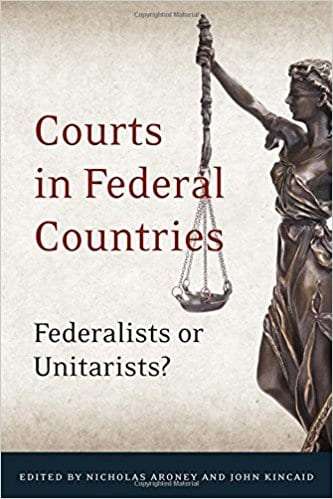The Volokh Conspiracy
Mostly law professors | Sometimes contrarian | Often libertarian | Always independent
Federal courts and political parties

Political parties play a vital role in federal systems, especially as forces for centralization or decentralization. Likewise, they play important roles in the make-up and behavior of courts.
Political parties control the institutions that select judges, pay their salaries, fund court budgets, bring cases to the courts, generate policies that trigger court cases, and enact laws and propose constitutional amendments that alter, augment, or diminish judicial decision-making. Such party dynamics, among other things, are examined in our edited volume Courts in Federal Countries: Federalists or Unitarists? (University of Toronto Press 2017).
Where there is a dominant federation-wide party, as in Nigeria and South Africa, courts tend to be centralist. Such parties usually favor a concentration of power in the center and are disposed to appoint judges favoring that agenda.
Despite a process of judicial appointment designed to ensure that its Supreme Court broadly reflects the country's diverse federal and geographical identities, Nigeria's high court leans in a heavily centralist direction.
South Africa's Constitutional Court generally supports hourglass federalism, which comports with the position of the African National Congress. In this arrangement, the provinces, which are potential competitors to the national government, are squeezed thin from the top by a dominant national government and from below by strong metropolitan governments.
Where there is no single dominant party, the situation is more complicated.
Where influential political parties draw support from particular states, courts usually have a less centralist orientation. India's Supreme Court, for instance, was heavily centralist before 1989, when there was a dominant federation-wide party (the National Congress). The emergence of several influential state-based parties (in addition to the presently governing Bharatiya Janata Party in the Union government) has corresponded with a softening of the Supreme Court's centralist inclinations. State-based parties are usually interested in preserving autonomy for their states and use their influence to push for the appointment of judges having state-friendly views. Similarly, the ending of the 71-years monopolistic position of Mexico's Institutional Revolutionary Party (PRI) after 1999 allowed more space for the federal Supreme Court to assert itself.
When two or more federation-wide parties compete and govern in both orders of government, as in Australia, Germany, and the United States, the federalist orientations of the court are responsive (or reactive) to the political philosophy of the governing party and the extent to which the parties are themselves centralized. Even if the state branches of the governing party are relatively independent, however, they may be obliged to support, or not openly oppose, the centralizing policies of their partisans in power in the national government.
When a federation has two party systems as in Canada and Spain, unitarist or federalist orientations hinge on the political philosophy of the governing federation party, the extent to which the federation parties are themselves centralized, and the ability of constituent-community parties to influence the governing federation parties.
Party influence can be crosscut by other factors, however. For example, members of Belgium's Constitutional Court-which is one of the most balanced between federalism and unitarism-are chosen in a way that gives a significant role to the constituent communities (primarily Flemish and Walloon). Members are appointed by the King from lists of two candidates submitted alternatively by the Senate (the region's house) and the House of Representatives, after being adopted by a two-thirds majority in each house. There is also a requirement that the Court be composed of six Dutch-speaking and six French-speaking judges.
At the other end of the spectrum, judges of Australia's centralist-leaning High Court are appointed by the central government with, at best, only nominal consultation by the federal attorney-general with his or her state counterparts. Judges to India's and the United States' generally centralist-oriented supreme courts are also selected through processes giving little role to the constituent states.
Parties also play important roles in determining what cases land on a high court's agenda and what issues are kept off the agenda. The widely observed judicialization of politics is evident in federations, too, where some controversial federalism issues are kicked over to the high court by divisive party politics. At other times, the leading parties, and especially a dominant single party, prefer to resolve federalism issues outside of court. On occasion, though, a high court reaches out to decide a political question.
Although few courts follow political trends slavishly, they do vary in the extent to which they are constrained by party politics. Generally, the high courts in developed federal democracies are more independent and less directly controlled by political parties than courts in less-developed and less-democratic federations. However, party polarization in the United States and the end of the Senate filibuster in 2017 might lead to appointments of more ideological partisans to the Supreme Court when the same party controls the Senate and the White House and to holding Court seats vacant for a year or more when the party opposing the president controls the Senate.
(We thank the government of Québec and Forum of Federations for essential financial and logistical support in producing this book.)


Show Comments (0)